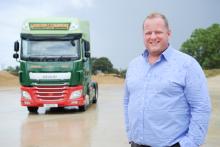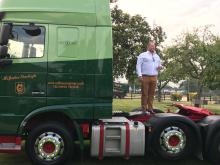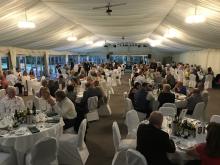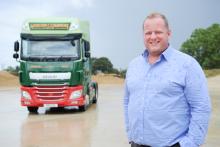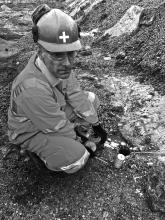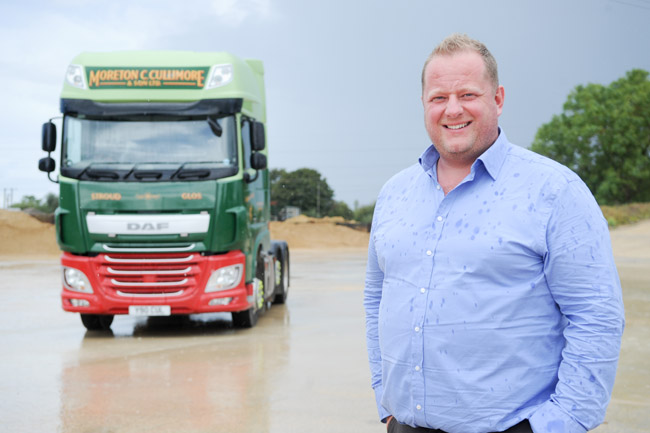
Building on success for generations to come, The Cullimore Group is working to maintain a family business while offering opportunities for all employees. AB editor Guy Woodford learns more
Family-run firms and organisations survive generation after generation by taking a long-term approach to how they do business. Three generations have steered the reigns at The
Having recently celebrated its 90th anniversary, The Cullimore Group employs around 100 people, ranging from quarry equipment plant operatives to HGV drivers and mechanics. Running four active sites – three in the Cotswold Water Park zone and one in Gloucester - the bulk of the Group’s customers are based in the west of England (Gloucestershire, Wiltshire, Oxfordshire and Avon & Somerset). The Cullimore Group is forecasting 2018-2019 financial year sales of more than £15 million, slightly up on 2017-2018, with group profits of around £600,000-800,000. The sales breakdown is likely to be around £4-5 million of gravel, £4-5 million of concrete and £3 million of transport/haulage-related business.
According to the Institute for Family Business, there were 4.8 million family-run businesses in the UK in 2016 employing over 12.2 million people, making up a significant portion of the UK’s workforce and employing almost 40% of all private sector employees. The running of any business presents challenges, but a family-run business presents its own unique demands. This is something The Cullimore Group is all too familiar with and has managed to excel at successfully by maintaining a family-business feel whilst encouraging and ensuring opportunities for all their employees and nurturing a sense of belonging, transparency, trust, clarity and responsibility.
Moreton C. Cullimore founded The Cullimore Group in 1927, when horse drawn carts were primarily used for the delivery of materials before HGVs were introduced. In 1961, his son Roger Cullimore joined the company and became joint director alongside his father. Roger reminisced: “My father was one of the first in the local farming community to have the vision and courage to invest fully in motorised transport.”
Roger Cullimore went on to have his own son, Moreton, who studied at Sheffield Hallam University and received a Bachelor of Arts degree (BA) in Business and Management, before completing a master’s degree (MA) in Sports Development. After graduating, instead of going straight into the family business, Moreton felt it necessary to cut his teeth elsewhere and gain knowledge outside of the family environment.
He made the decision to acquire wider business skills and strategies that would benefit The Cullimore Group and bring these skills and techniques back to the company having observed how insights are distinctively different and more challenging in a family-run business as opposed to a corporate and dispersed management system. Moreton recognised the need to challenge the status quo with new ideas in fast-changing markets and play to their strengths.
By taking time away from the business to study at university and gain the skills to run the business, Moreton chose to combine knowledge from his education as well as the skills passed through the generations of his family, to strengthen the running of The Cullimore Group. Now the Group’s managing director, Moreton says: “Being part of a family business is what makes my job enjoyable. I have people around me I can rely on and having a team who think in the same way makes my job that much easier. Of course, as a family we have our pressures, but having the support and loyalty of family and staff members means we overcome those. I’m proud of the family and people that I represent and the people I employ.”
Fundamental to the success of any family-run business is the ability to keep the channels of communication open and to balance the personal with the professional. Communication and governance are two of the major challenges faced by family-run businesses and knowing this and being open-minded and trusting is the first step towards creating a positive working culture.
Another challenge within family-run businesses is the issue surrounding succession and next generation integration into the business. The Cullimore Group has always recognised that there are huge opportunities for all employees to realise ambitions and nurture aspirations. By incentivising staff and recognising young ambitious employees who want a share in the business and to become stakeholders, The Cullimore Group has continued to advance as a company, providing these opportunities and creating an environment where staff feel respected and supported.
Moreton continues: “While it is fantastic that we can have the strong familial base that we do at the centre of the company, it is also hugely important to us that we are able to offer all our employees an engaging and supportive work environment with plenty of career progression opportunities.”
Moreton believes that keeping the family values of the company are important and ‘running the business as a business’ alongside maintaining employee motivation. Moreton also believes that rewarding and promoting fairly throughout the business is the secret to success as a growing family-run firm, and indeed any successful business.
In non-familial businesses, progression of who is in control of the company is open to a wide range of applicants, sometimes from within the company, but often from outside. This allows each new CEO or managing director the chance to start afresh and steer the company in new directions. One of the challenges of running a family business, however, is that there can be pressure on future family employees to live up to the successes of past generations and to keep up with or even surpass the legacy and reputation that other family members have spent their lives building. For some companies this can cause difficult relationships, but Moreton says The Cullimore Group has always tried to support each other and ensure that members of the team are prepared for the responsibility.
He explains: “We work hard to make sure that everyone in the company deserves their place. We train all our staff members to exceptionally high standards, whether they are related or not. Competence must be the criteria for employment, followed by years of consistent, high level performance that can then lead to succession.”
Although non-familial companies may have more straight-forward structures, The Cullimore Group believes its family-run ethos and values shared by its employees help it stand apart within the industry. By fostering an honest and open culture of merit and service-driven opportunity to match that of a conventional business model, the firm says it can compete with non-familial companies within the industry, and more importantly, become far more familiar with their customers. The Cullimore Group describes its service, therefore, as second to none; with each customer said to feel valued and not just like a bar code or serial number on a computer.
Moreton believes that perseverance breeds prosperity and The Cullimore Group’s ethos sends out a compelling message to the local community and to other firms that family businesses are a huge part of society and are massively important to our diverse economy.
Moreton concludes: “We have so much to look forward to, not just as a family, but as a business. We’re not just creating something that works well for our customers, but something that will continue to benefit our company, family members and employees for years to come.”

